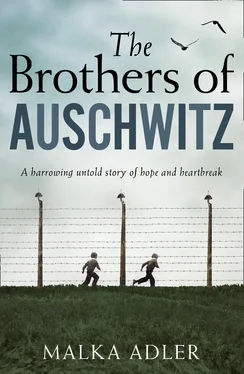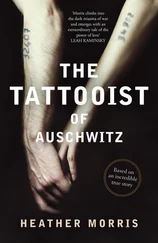Dov: Remember Mermelstein? Tall, with a beard,
recruited by the Czechs in 1939? He was a
gunner, rode a horse, six horses pulled a cannon.
Yitzhak: One of the boys from that family was with you.
Dov: Yes, but we lost each other along the way.
Yitzhak: We lost ourselves along the way,
Dov, look what happened to us. We lost everything.
I went by truck from Auschwitz to Camp Jaworzno.
It was the middle of summer. Hot. We traveled standing up. Crowded and stinking. I was finished. Two adults fell on me simultaneously. One died close to my eye, one on my shoulder. I carried them both until Jaworzno. The old pain in my groin came back. The place that would swell up and turn blue when I dragged heavy logs to the train track in the village. At night, I’d drag them with father and my brothers.
We got down from the train. Even hotter. Saw rows and rows of brown wooden barracks with thick, white smoke above them, like sand. SSman, two meters tall with a cap and a loudspeaker in his hand yelled, strip, you’re going to shower. I didn’t believe him. I was certain they were taking us to the gas. In my pocket I had a piece of bread. I hid it in my shoe. I thought, if I get out of the shower alive, a piece of bread will be waiting for me. Naked and thin we went into the shower. Tall men, short men. All ugly, disgusting, just like the goys always said about us. Everyone had white skin, sores and a smell. They’d press on their skin and there’d be a hole in the flesh, as if their skin was old. Their bald heads were brown like mud. A thin layer of bristles. Their nails were bitten to the quick. I thought, maybe it’s easier to kill people who look like this. I was sure I looked like that, too, maybe I was also disgusting, ugh, stinking. I started looking for a mirror, didn’t find one. I smelled my skin, it smelled like spoiled cheese.
We stood stinking and crowded under the taps and I didn’t know if they’d give us water and then gas, maybe gas and water together, maybe they didn’t have enough water in that camp and we’d have to wait like we did in the train car, and maybe we’d just stand there until we died.
The air became smellier. Someone near me pooped standing up. Two others in front of me did the same. Maybe out of fear. Silently I asked myself, if they’d put naked Christians in here instead of Jews, no, no, if they’d put naked Germans in here, say, the tall, blond men I saw in the newspaper, the ones who always looked as if they’d just had a good shave. Would they also be as ugly as us after two months in Auschwitz? I had an answer. Yes. It would be easy to kill them, because of the sores and the smell.
Some of them began to call Shema Israel, Shema Israel and to weep. The weeping spread like fire in cotton wool. I also wept. We all wept to someone about someone. They began to move back and forth, as if they had a beard and were in a synagogue, moving in shoes and coat and hat. And suddenly water.
A flow of boiling water hit us on the head. Water without a smell. We couldn’t escape the burning. Nonetheless we screamed water, water, and in a flash, the tap was turned off. We were saved. The men’s weeping turned to roars of laughter. The tears remained. For the first time since leaving home I saw Jewish men laughing. I knew a piece of bread was waiting for me in my shoe. I started to hug someone next to me. We wept together. In the meantime they opened the door. At once we shut up so the Germans wouldn’t change their minds. They gave us clean clothes that didn’t smell. The black stripes looked darker. They put us in a dark bloc with three-tiered bunks. I couldn’t see any windows. The walls were brown. The light bulbs were faint. I managed to get a place farthest away from the floor. I ate my bread lying down; I was happy that day in Camp Jaworzno, higher up than Auschwitz.
The next day we returned to the morning and evening parades. We stood for hours on our feet, sometimes just because of a mistake in the numbers. Those who fell on parade, fell and that was that. Didn’t get up. A disgusting smell grew in the camp that increasingly consumed our minds and clogged up our asses.
At Jaworzno I worked in construction. Dangerous work. Because I was small. We helped build a factory for supplying electricity. The professionals were Germans.
We worked in excavation and construction. I was lowered in a basket into a six-meter-deep pit. I descended slowly into the darkness. I dug with a spade at the bottom of the pit. I sent the sand up in the basket. It was dark in there, suffocating. The earth was cold and my body full of water. I dug for about six hours straight. After a food break, another six hours, down in the pit. The Germans didn’t reinforce the sides of the pit. Grains fell into my eyes all the time. I put my fingers in my eyes, it didn’t help. I tried to wipe them with the striped pajamas, that was worse. I remembered that someone had died from an eye infection, but not only from that, he had other diseases. I tortured myself with thoughts of the coming collapse. I knew there was a big chance of a collapse. I knew that only the depth of the pits interested the Germans, I didn’t count. I knew I could be replaced by a whole transport . It was clear that I could be buried alive in a heap and that the sand would cover me and get into my ears, nose and mouth, and that I’d have to breathe sand in through my nose until death. I dug as slowly as I could. For months. Other small prisoners like me were digging in the pits next to me. Many died in the sand that fell on them. Don’t know how I stayed alive.
And then came winter.
All we had was the same striped on the clothing. No coat. No socks, vest or underwear. The frost was terrible. I couldn’t feel my palms. The same for the soles of my feet, and it was only a matter of time before my fingers fell off. I was certain that tomorrow, the next week, following month, I’d find three fingers on each hand, or three toes on a foot, or I’d come out of the pit in the basket without a thumb. I dreamed of fire. One day, on the lunch-break, I found a few planks. In my pocket I had paper and matches. I went behind a wall, and I lit a fire.
The work manager came up to me.
The work manager was a young Pole of twenty-five. He had huge hands. He had a neck as thick as a bull. He stood the prisoners in a line, dragged me in front of them and ordered: Bend down. I bent down. Waited for a bullet in the head. The work manager took a large plank in both hands and struck me with the plank in the middle of my backside. Thwack. I felt I was falling to pieces. Thwack. Jew lights a little fire, warms his hands and the Pole, damn him, crushes. Yes. Thwack. I counted five blows. There was no flesh on me. I was skin and bone. I felt as if even my bones couldn’t hold up under the skin. They were like nuts knocking about inside a towel. Thwack thwack thwack thwack thwack. I didn’t open my mouth so my bones wouldn’t spill out.
For a month I couldn’t sit down. During breaks I stayed on my feet. Leaning first on my right leg and then on my left. At night I couldn’t sleep. I lay on my belly and didn’t know if my ass was open or leaking. I felt a tingling in my backside and was sure worms had got into the wound and were now eating me alive. Every few minutes I carefully felt the place around the wound. It was wet there. Then it was wet and smelled. Then it began to get hard there with a scab. Finally it was dry but really hurt. It hurt for two months.
The bombing of Jaworzno by the Russians almost killed us all. Noon. It was a food break. I was waiting in line for a bowl of hot soup.
I knew I had no chance of getting anything from the bottom of the pot because I was small. Every time I’d stay away from tall prisoners who approached me, an elbow ready. I already knew those elbows. They were like a snake. Thwack. And quiet. The guards saw nothing.
Читать дальше












